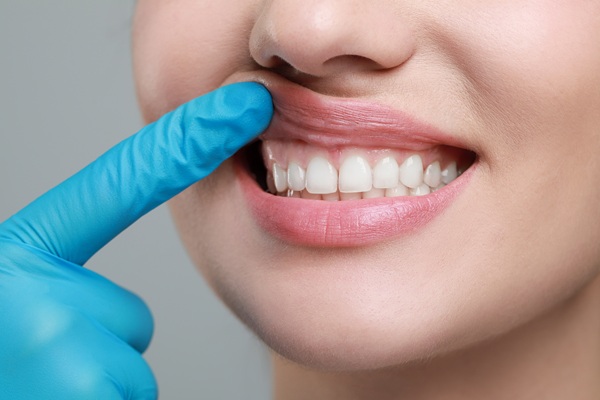Oral Surgery and Gum Recession

If you are noticing that your teeth are starting to look longer, or if you are constantly feeling newfound sensitivity to hot and cold foods, it is quite possible that your gums could be receding. What this simply means is that a portion of your tooth's root may be exposed — thankfully, this is totally fixable.
Gum recession occurs naturally and gradually, and it may sneak up on you. However, oral surgeries such as gum grafting treatment can help treat receding gums and help prevent any further loss of gum tissue.
Causes of gum recession
Gum disease, or periodontitis, is a common cause of gum recession. There are plenty of illnesses that can increase the risk of initial infection. This includes inadequate oral hygiene, genetics, hormone changes, diabetes and poor health in general. Frequent smokers are also four times more likely to develop gum disease as opposed to a non-smoker. Improper brushing techniques and any sort of extreme force placed on your teeth that causes grinding or clenching can also cause gum recession.
Oral surgery for treatment
When receding gums are caused by plaque buildup, the first step is to have a professional cleaning. This can help remove any bacterial plaque or buildup along the gums and teeth. It can also help clean the surface of your roots and help heal your gums as well as prevent any further recession. If the recession is more extensive and past a professional cleaning, you may have to look into gum grafting surgery. This surgery not only repairs the recessive gums but also helps prevent and cleans up any additional infections in the mouth.
Types of gum grafts
Typically, there are three types of surgeries available to fix recessive gums. Connective-tissue grafts are the most common and are typically used to treat one or more areas of recession. For this procedure, tissue is taken from the flap of tissue in the roof of your mouth and is stitched over the area of the exposed root. Free gingival grafts are similar, but the tissues are not taken from the mouth, with the tissue being taken from the palate directly. Pedicle grafts are the same process, except using the tissue adjacent to the tooth in need of repair. The procedure is generally quick and is simple. Once the dentist finishes a simple stitch, they will have you wash your mouth with mouthwash and you will be on your way.
Benefits of oral surgery
Donated human tissue that has been medically cleared can also be used in the grafting procedure, making it a popular procedure. In addition to helping with tooth sensitivity and protecting the roots from root decay, gum grafts help protect and fight against bacteria within the mouth. They also help prevent any grinding and can help fight against any misalignment in the teeth.
Oral surgeries are definitely an option for receding gums. Graft procedures are great because they are quick and can help clean the mouth in the process. As with all procedures, make sure to clean the affected area properly and eat soft foods to ensure that you do not damage the graft. Avoid hot foods that can also burn and irritate the graft.
Are you considering oral surgery for gum recession in the Palm Beach Gardens area? Get more oral surgery information at https://corderoperiodontics.com.
Check out what others are saying about our dental services on Yelp: Oral Surgery.
Recent Posts
Undergoing oral surgery can feel overwhelming, but proper post-operative care is crucial to ensure a smooth recovery. Whether you have had wisdom teeth removed, dental implants placed, or another procedure, following the right recovery steps can help minimize discomfort and prevent complications.First and foremost, the oral surgeon will provide detailed post-operative care instructions specific to…
If you have an oral surgery procedure coming up, read on to learn more about the process and recovery. The extraction of a tooth requires oral surgery and it typically comes with a 10-day recovery period. The key to a quick recovery from a tooth extraction is keeping the blood clot that develops in its…
Corrective jaw surgery is not something very many people are familiar with. This surgery can help with a number of issues that could be impacting a person’s health or appearance. Understanding the critical facts related to this corrective procedure is important for patients who are having challenges caused by the shape, position or health of…
When one or more of the teeth are missing, the oral surgeon will recommend the best option to replace them. The alternative to bridges, partial or full dentures are dental implants, which replace the root of the lost tooth and support a dental prosthesis. They are the closest option to natural teeth available. Continue reading…


